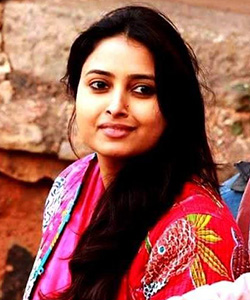
Kulsum Fatima (She/Her)
Assistant Professor & PhD CandidateCountry: Canada
Languages: English, Urdu, Hindi
Sectors: Academia, Education, Freelance
Primary Water Expertise: Advocacy, Climate Change, Community Engagement, Cultural Dimensions, Integrated Water Resource Management (IWRM), Policy and Governance, Sustainable Development Goals (SDG's), Social Dimensions
Graduate Student
"I am an architect committed to water sustainability"
"My lived experience evolves around natural water resources and their connection with University campus"
"I am committed to whole systems design thinking approach in combination with experiential learning engagements at Higher education campuses to explores means and methods for advancing United Nations Sustainable Development Goal 6 (UN SDG6) local community scale. "
Water Experience
Prior to beginning her PhD, the major focus of her work was to find solutions to problems related to unclean water and water shortages within communities in India, specifically in regards to how these issues affect women. From 2016 to 2019, she held the role of thematic lead for water for the national sectoral steering committee for the habitat sector, Technology Information, Forecasting, and Assessment Council at the Department of Science and Technology within the Government of India. During this role she has led the preparation of status report on India’s climate change and habitat initiatives for the United Nations Framework Convention on Climate Change. She has brought international attention to concerns surrounding water issues by collaborating with workshops at the University College of London, in addition to organizing a workshop alongside the San Diego State University where delegates from all over the world came to discuss how they address these concerns in their countries in hopes of aiding India. Fatima has given multiple lectures on women-centric inclusive design including at the University of Peradeniya in Sri Lanka, Manipal University in Dubai, UAE, and the University of Kwazulu-Natal in Durban, South Africa. In 2018, she co-facilitated two sessions at a workshop dedicated to building more inclusive and equitable cities for women at the Transportation Research Board 97th annual meeting in Washington, DC. In her role as an assistant professor at JMI University in India, she offered her support to various research projects conducted by students which were dedicated to nation-wide female empowerment. Fatima has remained fierce in her dedication to changing patriarchal beliefs by making a more inclusive society for women in India. In her local community, she has brought awareness to the health risks of consuming unclean water. In more distant communities, she has promoted the education of girls who were tasked with fetching water for their families by working with local NGOs to distribute supplies to these communities in order to make more time for girls to go to school instead of having to walk for water. Her accomplishments have also made more women interested in taking on research opportunities and leadership positions like hers. Currently, her PhD research looks at establishing a net-zero water approach at the UCalgary campus, while creating more experiential learning opportunities for community engagement that will promote UN SDG6 applications on campus. In her future research, she plans to look at water sustainability in Indigenous communities and how it affects Indigenous women in Canada. Additionally, she runs a group which helps her fellow alumni of JMI University with the resources they need, such as mentorship, guidance, networking opportunities and mental health support while settling into their new life in North America.
Opportunities of Interest
- Speaking engagements (e.g., conference panels, keynote addresses)
- Leadership roles (e.g., board member, committees)
- Public outreach (e.g., media interviews, podcasts)
- Volunteer opportunities (e.g., community based projects)
- Consulting (e.g., government, industry, not-for-profit sector)
- Research (e.g., academic, not-for-profit, government)
- Being a Mentor
- Having a Mentor
Opportunities Offered
- Graduate student training (e.g., masters, PhD)
- Mentorship Short-term (e.g., attend a mentorship circle or event; 1-3 meetings with an individual)
- Mentorship Long-term (e.g., regular attendance at mentorship circles, frequent meetings 6+ months)
- Research assistant
- Student internships
- Visiting Professorships
Languages: English, Urdu, Hindi
Sectors: Academia, Education, Freelance
Primary Water Expertise: Advocacy, Climate Change, Community Engagement, Cultural Dimensions, Integrated Water Resource Management (IWRM), Policy and Governance, Sustainable Development Goals (SDG's), Social Dimensions
Graduate Student
